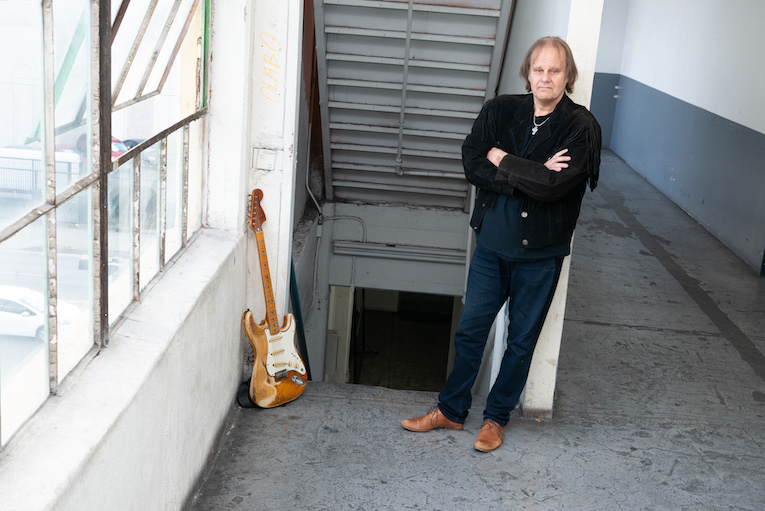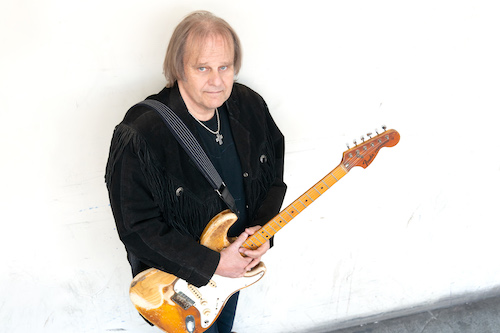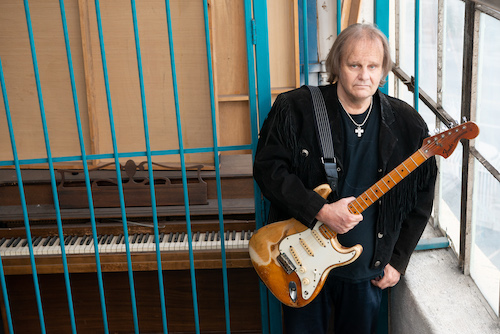
Photo: Walter Trout by Alex Solca
By Martine Ehrenclou
Iconic blues/rock guitarist, singer, songwriter Walter Trout digs deep on his new and 30th solo album Ride. The four-time Blues Music Award-winner temporarily moved to Denmark with his family to escape the pandemic. As a liver-transplant survivor, he is more at risk and had to protect himself. He is a living blues/rock legend, a revered and beloved musician who is known for his soulfulness even on absolutely ripping guitar riffs. Trout joined John Mayall’s Bluesbreakers as lead guitarist in 1985 before embarking on his solo career in ’89.
Following Trout’s last album, the critically acclaimed Ordinary Madness, his new release Ride is flush with insightful and moving songs, a powerful collection of blues/rock and rock tracks. Trout spent two weeks in his now abandoned house in Southern California, writing songs for the album, his troubled childhood in New Jersey resurfacing as he wrote. The tracks are poetic, insightful, full of imagery. The music is uplifting, often fun and rip-roaring with Walter’s blues rocking guitar and soulful vocals.
The downtime in Denmark was a first for the iconic musician. Sixteen months of not performing because of the pandemic wasn’t easy for him. His wife and manager Marie presented a new record deal she had negotiated for his 70th birthday, knowing he needed to make music again. Walter’s producer, Eric Corne, found a new Los Angeles studio and gathered the musicians (Michael Leasure on drums, Teddy ‘Zig Zag’ Andreadis on keyboards, and Jamie Hunting on bass) to record the new album.
Walter joined me on Zoom from Denmark.
Martine: Your songwriting is so good on Ride. And I thought the songs on Ordinary Madness were great.
Walter: Thank you. You know something? Songwriting is something that I love doing, and I love trying to expand my songwriting. I’m a bluesman, but I will tell you that as much as I listen to Jimmy Hendrix, I also listen to Tony Bennett. Songs like “Follow You Back Home” and “Destiny” are proudly my favorites on Ride, because they’re so different than… I put this in quotes, “Than what you would hear a blues rocker do.”
Martine: Your guitar solo on “Follow You Back Home” is absolutely gorgeous.
Walter: Let me tell you, I specifically thought to myself before I did it, I’m going to just deal in pure emotion on this solo. I’m not going to try to impress anybody, I’m not going to try to wow anybody with technique. Because that’s a very emotional song for me. It’s hard for me to even listen to. That is my favorite solo on the record. So, thank you very much for that. I appreciate it.
Martine: Do you want to talk about that song or the album in general?
Walter: Well, I don’t want to go into a lot of detail, but my wife and I went through a phase where we split for a little while, and I went and lived in a hotel. We said, “What do we want to do? Kids are grown up. We’ve been together 30 years. Let’s figure it out.” We came out of this, I think, closer than we ever have been because we made the decision that we want to be together. So, let’s do this.
But we had to go through that. I was in a hotel down the road from my house, and I would sit there at night eating my fast food veggie burger, knowing that my entire beloved family, the light of my life, was down the street, having a nice family meal.
When I was writing the songs, I was alone in my Huntington Beach house and wrote this whole thing in two weeks. I said to myself, close your eyes, put yourself back in that hotel. How did that feel? Put it in words, put it in music, put it in the guitar solo.
Martine: Can you tell me a little bit about the album?
Walter: We were in the middle of the pandemic. I was on tour with my band. Like every other band, we canceled the tour. We came home. Then Marie and I came over to our house here in Denmark. We’re in a fishing village of 500 people on the edge of the North Sea.
We felt very safe over here. It’s a tiny village, where the fishing crew comes up on the beach and sells the fish out of the boats and stuff. It’s very beautiful, but completely different than Orange County. It’s 500 people here in the whole town. We thought, we have a place where we’ll be safe, or at least safer. Let’s go over and maybe we’ll be there for a month or two. (laughs)
It was a year later, it was my birthday, March the sixth. My son Dylan is here, and he says, “Dad, come on in my room for a second.” I walk in his room. He has his computer and he has a Zoom call going. On the Zoom call is my entire band, my producer Eric Corne, my wife, and the president of Provogue Records, Ed van Zijl. Ed says to me, “For your birthday, Marie has negotiated a brand new record contract.” Then Eric Corne says, “I have gone out with the band and have found a great studio for us to record. The band’s ready. I’m ready.”
Then Marie says, “We’ve bought a plane ticket for you. You’re going to L.A. and you’re making a record and getting your ass off the couch, because you have to do it.” She goes, “You haven’t made music in a year, and you’ve got to go back to doing what you do.”

Photo: Walter Trout by Alex Solca
I went into my house in Huntington, and I spent two weeks writing it. For the first day or two, I sat around and watched TV, and had food that I liked. I thought, I don’t have any ideas. Let me go back. This is my 30th album, so let’s say I’ve recorded 300 songs of my own. Every one of those songs has a story, it’s about something.
I can’t just write nonsense. So, once I got into that mood, the first one was “Ghosts.” The way that happened was, I was in my car listening to the radio. On came a song from my childhood, a Beatles tune. It brought back a memory of how much my friends and I loved The Beatles. It brought back a memory of being in my house, where there was a lot of violence and some of the stuff that was going on while I was 13, listening to The Beatles. I realized everyone that hears a song that they loved when they were a kid, you flood with memories. But some of them are not always good.
That was the first one. Then, I found a poem I had written about the house I lived in Laurel Springs. The house was right next to railroad tracks. I would lay in bed at night and the bed would shake. I would dream every night of getting out of there. I would think, I could escape if I get up out of this bed, I put my clothes on, I cross the street, I hop on that freight train and I get the hell out of here. I had written a poem about it five years ago. I could hear the train rolling by. It shook the house and it shook the bed. I looked at it and went, man, I can put this to music. That was the second song (“Ride”), and then they just went from there.
Martine: That guitar solo on “Ride,” at least to me, is what it might feel like to hop on that train.
Walter: That’s what I was trying to do. As I was playing the solos on this album, maybe more than any other album I’ve done, I thought about the lyrics. What’s the song about? Can I portray that through my guitar?
Martine: You mentioned earlier that you had not played any music for over a year. Does that mean you hadn’t played guitar, didn’t sing or anything?
Walter: I had sat around on my couch over here and played guitar quite a bit, because I was determined not to lose it. I would go online–there’s these online guitar lessons, and I would think, well, it’s a chance for me to learn some new techniques. I’d be on a site that says, “Learn to sweep pick like Yngwie Malmsteen.”
I’m sitting there doing this and one of my sons came in and said, “Dad, why are you doing that?” I said, “I’m trying to expand my technical stuff.” He said to me, “Your whole music is about playing from your heart.” He also said, “Instead of worrying about virtuosity, just play yourself. Be yourself, Dad.” That was in my head when I did the solos on this album too, be yourself.
Martine: These songs are so honest and authentic. You were so in it. Some of your songs like “Ride”– just beautiful.
Walter: Thank you. Again, that one was a poem I had written about that house in Laurel Springs, New Jersey. I had good memories there, but I had some horrific, terrifying memories of terror and horror in that house also.
I didn’t set out to do this, Martine, but just today, my wife and I, knowing I was going to talk to you, we sat and listened to the whole record about an hour ago. I haven’t heard it in a while. I have realized that eight out 10 songs are me looking back and reflecting on my past. I think part of that is that I know I am 71. I have my second liver. I don’t know how long I have. I am deeply aware of mortality. I find myself looking back more and more at my life. Like those lyrics, “Now my life appears before me and I can see it all so clear. I think I’m just starting to understand the reason I am here.”
Martine: What is the reason you’re here?
Walter: I think the reason I am here is because I was given a talent, and I have tried to, especially since I got sober, to share the best of that talent with the world. I have a message. I can go out every night and talk about organ donation and how it saved my life. But I wrote a song years ago called “Collingswood,” and it’s about my stepfather and the drinking and the violence. I was playing in a club, probably 15 years ago, and this giant, burly, biker guy walked in and looked at me. I thought, “What’s up with him?” He came up to me and started crying. He said, “In that song,” he goes, “You wrote my life. Thank you.”
Walter paused. “That’s the reason I’m here.”
Martine: People identify with your lyrics, your music. It gives them permission, I think, to feel. Ride provided an emotional release for you. How was that different than with your last album?
Walter: I think all my albums have done that. But being out playing in front of people is the big release for me. I look those people right in the eye and I play right to them. To me, it’s all about the connection, the human connection, the common humanity here. The fact that I had sat on the couch for a year, knowing that eight years ago I had to relearn how to play the guitar, I had to start over again (because of liver transplant). I got it back.
I know that my time, the clock is ticking, ‘till I’m gone. I want to share it. I want to contribute to the world. I’m driven to contribute. I just think I had a lot of pent up stuff. I hear it in the guitar solos. I don’t know how to say this. I am purposefully trying to play less notes, but say more.

Photo: Walter Trout by Alex Solca
Martine: You definitely accomplished that. Can you talk about your song “Hey Mama”?
Walter: Yes. That one is a conversation with my mom, and I actually had to change some of the lyrics because it got a little too personal. But things like, “I remember when you told me to hold onto my self-respect, when it’s me they vilify.” When I first was playing with Mayall, and then I went solo, there were reviews coming out where I was hated by certain blues purists.
I would get affected by some of these reviews or some of the comments. She (his mom) would tell me, “Hey, Walter. Hold onto your talent, hold onto your ability. Don’t let them stop you. Keep going. Believe in yourself.” I can tell you a lucky thing with both my parents. Both my mom and my dad were music lovers, and music aficionados. When I went to them at age 14 and said, “I don’t care about school. I don’t care about anything because I just heard Michael Bloomfield. I’m going to be a blues guitar player, and that’s going to be my life. That is my calling.” Instead of saying, “Oh, that’s a pipe dream. You need something to fall back on.” Instead of that, they both said, “We hear you in your room playing, and we think you can do it. More power to you.”
Martine: Wonderful they were both so supportive.
Walter: They were both incredibly supportive and proud. When I was a little boy, my mom took me to see Ray Charles and James Brown. I spent the afternoon with Duke Ellington when I was 10. She (his mom) set that up. My father would take me to black jazz clubs in Atlantic City, and they were just incredibly supportive of it because they loved music. Loved it. One of my big memories of my mom–she had an album of Ray Charles’ old Atlantic stuff, which was blues. I was a little boy and I walked in the room and she was standing there crying. I said, “Mom, what’s the matter?” She said, “It’s that song. I can relate.”
Martine: In our last conversation, you said that songwriting was healing, referring to Ordinary Madness. Was writing for Ride therapeutic too?
Walter: I think this one in some ways was more therapeutic than the last one. The last one was finished before the pandemic. It was sent in to the record label at the end of February, and the pandemic really kicked in in March. A lot of people think that Ordinary Madness was about the pandemic, but it wasn’t. That was just me again, going through… I was just still being really in some ways affected by things from my childhood. I’ve been with therapists, I’ve done all that, and I’m okay. I’m a happy guy. I’m joyous to be alive and to be creating and to have a family, and all of it. I feel like the most lucky, blessed man on the face of the Earth. But down inside I still carry some of this shit.
For more information about Walter Trout see his website HERE
Watch “Waiting For The Dawn”

Wonderful interview! Really informative about his song writing process and his solo guitar styling and how his childhood, good and bad, inspired his songs on this album. Loved the video and Walter’s soulful playing and singing!